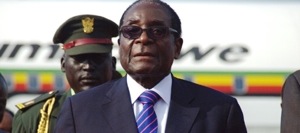President Mugabe. Photo-Flickr
[Editorial]
There are today unconfirmed reports that the Military in Zimbabwe may be in negotiations with President Robert Mugabe for him to relinquish power.
The media in Zimbabwe have been reporting for many months now on escalating tensions between President Robert Mugabe’s wife Grace Mugabe and former Vice President Emmerson Mangagwa who was finally ousted on November 6.
There have been reports that Grace Mugabe had been angling to succeed President Mugabe who has led the country since its independence in 1980 and is now 93 years old. He led and helped engineer victory after a long struggle for liberation.
Mangagwa, also a former security minister, has been a long-time ally and comrade of Mugabe. The two spent many years in prison under Ian Smith’s White minority Apartheid regime when the country was still called Rhodesia. Later, Mangagwa was a top aide to Mugabe when they fought the liberation war as members and leaders of ZANU-PF. Together with the late Joshua Nkomo, and with the support of the Frontline States of Tanzania, Zambia and Mozambique and most African countries, the Smith regime was ultimately defeated.
Mangagwa has remained close to the powerful Zimbabwe War Veterans and the Military. Since his recent dismissal, and reported exile to an undeclared location, all eyes have been trained on reaction by the military. Yesterday, General Constantine Chiwenga read a 14 minute statement to the media.
The War Veterans are former fighters who went back to their roles in society -teachers, farmers, carpenters, doctors, lawyers, nurses, laborers– or remained in the army then retired after the defeat of Smith. When Britain and the United States reneged on the promise to provide Zimbabwe with money to purchase land from White settlers and redistribute them to Africans the War Veterans took matters into their own hands. They started seizing and occupying the land. Mugabe’s government had no choice but to follow the War Veterans’ lead and escalate the pace of land redistribution, on terms the government could pay. The land had been stolen from the ancestors of Africans who became landless when Zimbabwe became a British colony.
In recent weeks the War Veterans leadership including Christopher Mutsvanga had made comments supportive of Mangagwa and very critical of Mugabe, calling him “senile” — and declaring that Grace was “mad.”
In his statement yesterday, Gen. Chiwenga was very respectful of Mugabe, calling him the country’s only “commander-in-chief.” He also quoted Mugabe’s past statement that Zimbabwe would never become a colony again.
Yet, Chiwenga also bluntly made it clear the military would seize power if the in-fighting in ZANU-PF continued. He warned that there were “reactionary” elements who wanted to turn Zimbabwe into a neo-colony. He decried what he called “reckless” statements by politicians and an attempt to divide the armed forces. He warned that the military wouldn’t allow Zimbabwe to collapse into civil war and gave the example of Somalia. He said the military was a major “stockholder” in the affairs of Zimbabwe and that it would take “corrective” actions to uphold the constitution. He also said the military wanted “counter revolutionaries” to be “exposed” and to be “fished out.”
Chiwenga also warned that the purge of ZANU-PF members who participated in the war of national liberation should stop immediately. This reference was clearly a defense of Mangagwa and others.
Chiwenga’s statement was carried live on social media. The statement was later published on the government newspaper, The Herald. It was then later deleted.
Have lines been drawn on the sand? Can Gen. Chiwenga and the War Veterans have their way and get Mangagwa restored to the party and to the leadership hierarchy? Would any reconciliation be seen as capitulation by Mugabe given the very public rebuke of Mangagwa by both he and Grace? Will Mugabe instead try to remove Chiwenga? Or will Chiwenga ease the president out of power? How would Zimbabweans react to the military taking a role in the country’s political affairs? The African Union is obliged to suspend a country from membership if the army seizes power.
Zimbabwe endured Britain’s vindictive attempts to undermine land redistribution under Tony Blair. Britain even tried to recruit South Africa when Thabo Mbeki was president help depose Mugabe. Britain then led and recruited Western countries to impose the destructive sanctions that have damaged Zimbabwe’s economy and remains in place.
It would be tragic if in-fighting leads to even more instability in Zimbabwe.







